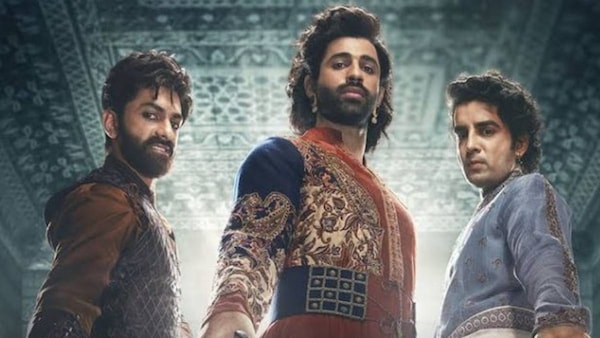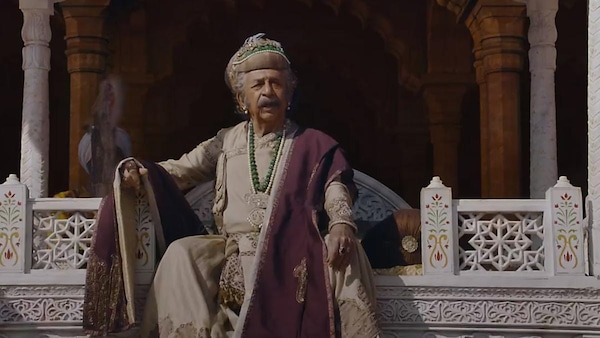Taj: Divided By Blood — A Campy & Confounding Mughal-e-Spasm
This is #CriticalMargin, where Ishita Sengupta gets contemplative over new Hindi films and shows. Here: ZEE5's Taj — Divided By Blood.

Last Updated: 01.36 PM, Mar 03, 2023
THERE IS HARDLY another Hindi film actor who plays non-committal fathers on screen with as much conviction and continuity as Naseeruddin Shah. The veteran performer’s filmography is dotted with the reprisal of a similar kind of role — an absentee father (Masoom, Main Hoon Na, Zindagi Na Milegi Dobara) who leaves his offspring in perpetual need of paternal validation. The iteration has been so noticeable that Shakun Batra used this as a conceit in his 2022 film, Gehraiyaan. On the personal front, Shah has been a vocal liberal advocating religious tolerance in a climate of bigotry. An amalgamation of both holds terrific cinematic promise. The good news is it has sort of happened in the new Zee5 show, Taj: Divided by Blood. The bad news is, the series doesn’t deserve him.
The 10-episode outing (approximately 45 minutes each) is set in the 16th century and tracks the legacy of the third Mughal ruler, Akbar. The premise centers on the fight for the throne between his three sons: Salim, Murad and Daniyal Mirza. Shah essays the role of Akbar, the ruler known for secularism and, as legends suggest, brutality that did not leave even his children untouched. This narrative of succession, hinging on the approval of the patriarch suits the actor well. That he essays the character of a Muslim secular man, who holds the reins of choosing his successor while his sons are required to earn his approval feels like a sly extension of his personal and (acquired) professional leanings.
Having said that, casting Shah, with his impeccable Urdu diction, as Akbar is the one and only right thing the show does. Directed by Ron Scalpello, Taj is an exhaustive retelling of a particular period in the Mughal era. The sprawling ambition is undermined by the superficial effort of the makers, who are preoccupied in fuelling selective conjectures of Mughal history. This too would have made sense had they committed to it. In the absence of which, the 10 episodes feel unending and emotionally synthetic.
There are several problems plaguing Taj: Divided by Blood. But the one that leaps out, ironically, is the casting. For a show teeming with characters, it exercises zero clarity in their depiction. For instance, all the three sons are essayed by actors who look tangibly modern. Aashim Gulati as Salim, Taaha Shah as Murad and Shubham Kumar Mehra as Daniyal appear as sore misfits in a historical drama. It is not just the face but the tonality and reading of the characters.
For instance, Gulati behaves like such a Bandra boy that even when he is wearing robes, he seems one heartbeat away from holding a Starbucks coffee mug with his real name on it. His hair falls on his face a certain way and he grins like he is forever alert to the presence of a camera. Granted, actors doing period films should not have to speak in a dated manner, but they also ought to make an effort to inhabit the grammar of the role. None of them do. In fact, in certain scenes the lack of trying manifests in inadvertent comical ways. You can spot the fake sideburns hanging precariously, and on close-ups the botched dubbing is painfully visible.
Almost as an extension of this, Rahul Bose is cast as Mirza Muhammad Hakim, Akbar’s step brother. It is a baffling choice because Bose, an otherwise limited actor, excels majorly in urban roles (Aparna Sen’s 2010 film, The Japanese Wife notwithstanding). As proof, just hear him talk. In the show, he struggles for the most part, screaming his lines and throwing his words. And finally, when he has had enough, he gives up. In one of his concluding scenes, he refers to Daniyal as anglicised Daniel. Honestly, I was waiting for it to happen.

None of these should give the impression that Taj: Divided by Blood is a subversive, contemporary retelling. Because it is not. It is a campy show which opens with a puzzling scene of Salim pressing the breast of a concubine. In fact, most of the narrative choices in the series seem to be made with the expressed purpose of catering to a certain audience. Arguing over the authenticity of the past is a futile exercise, more so given that Mughal history is shrouded in speculation. But in this case, the thematic choices and the people behind it (mostly white; the story is credited to Christopher Butera, the screenplay is by William Borthwick and Simon Fantauzzo, and Ian Arber has scored the music) give an indication.
The interpretations that the show adopts are largely ethnocentric. For instance the prominence with which Anarkali is depicted here and the arc she is given, is tied to 17th century British tourist William Finch’s mention of her in his travelogue even as the legitimacy of her existence remains a point of contention among historians. Or consider even the amplified portrayal of the male rulers’ debauchery. It is one thing to humanise characters and another to exaggerate them through shoddy filmmaking.
I’d argue that in the current political climate, Mughals are an easy target to do so. In any other show about Hindu rulers, such poetic license, irrespective of the result, would have caused cancellation or worse, police cases. After all, we are the same country that threatened to cut an actress’ nose under the assumption that she disrespected Rajputs in a film. Even before its release. Taj: Divided by Blood unfolds, fully cognisant of this. Maharana Pratap, the Hindu King of Mewar, features here too and his praises are sung even in his absence. Some characters are written with time, others are written by it.
